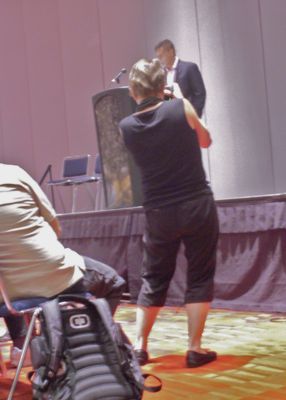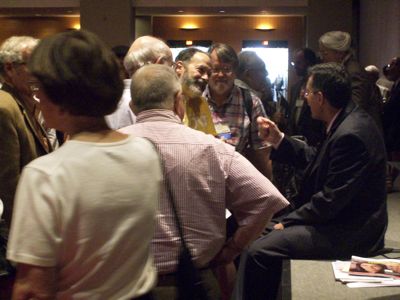Charlotte, N.C.
General Assembly hasn’t begun, but ministers and religious educators have already arrived here for professional meetings: “Ministry Days” for ministers and seminarians, and “Professional Day” for religious educators. I won’t say that the streets around the convention center are swarming yet with Unitarian Universalists, but when I went out to get lunch today I ran into Rosie and Marie, old friends from seminary, on the sidewalk, and Nancy, a minister from the Bay Area, while crossing the street, and I saw several other people at a distance whom I felt sure I knew.
Just after four o’clock, I went over to the Hilton Hotel to register for Ministry Days. There were ministers everywhere: ministers in sandals, ministers in seersucker suits, ministers in dresses, ministers in hip black West coast urban garb, ministers in Midwestern pastels, old ministers, young ministers, ministers all over the place. Some of them were people I have never seen before, some of them were people who looked familiar, some of them were people I once knew, a few were people I know quite well. Unfortunately, my brain does not allocate much processing power to my facial recognition software, so when I am in large groups of people I often cannot cannot process faces rapidly enough; as a result, I tend to wander around looking vaguely dazed and slightly bewildered (more so than usual, that is).
Fortunately, I ran into my old friend Ellen, with whom I served at First Parish in Lexington, Massachusetts under Hellen Lutton Cohen. Ellen had not yet eaten, and was looking a little pale, so we went right out and looked for a place to eat. All the cheap restaurants I had looked up on the Web seemed to close at five o’clock. We finally wound up in Halcyon, the restaurant next to the Mint Museum. Ellen told me all about the things they’re doing in her church in Chelmsford, Massachusetts — the successful evening worship service, the way she mobilizes amateur musicians within her congregation, their coming of age program, their youth service trips to Saint Bernard Parish south of New Orleans. Then it turned out that our waitress grew up on Nantucket, so she and I tried to figure out if we had any common acquaintances, but the people I know who live there are all quite a bit older than she. Then Carol joined Ellen and me, and we began talking about families. We walked Ellen back to her hotel, talking all the while.
By the time we got done, today’s program for Ministry Days was over. Yet though I hadn’t attended any official programming, I got more good ideas while eating dinner with Ellen than I get in most half-day professional workshops.


